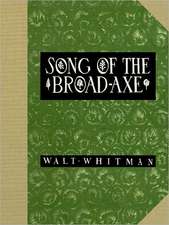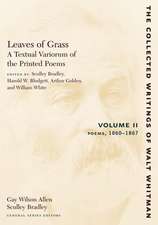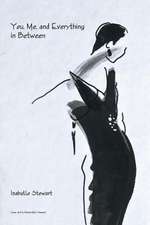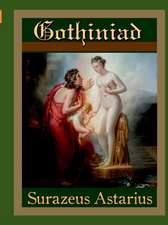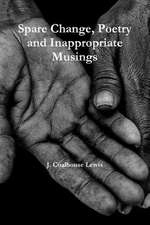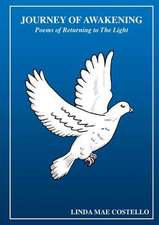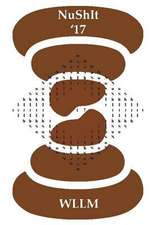Leaves of Grass: A Kid's Guide to Fitness: Bantam Classics
Autor Walter Whitmanen Limba Engleză Paperback – 31 mai 1983
Din seria Bantam Classics
-
 Preț: 39.98 lei
Preț: 39.98 lei -
 Preț: 35.14 lei
Preț: 35.14 lei -
 Preț: 32.91 lei
Preț: 32.91 lei -
 Preț: 33.77 lei
Preț: 33.77 lei -
 Preț: 29.86 lei
Preț: 29.86 lei -
 Preț: 32.08 lei
Preț: 32.08 lei -
 Preț: 34.03 lei
Preț: 34.03 lei -
 Preț: 36.91 lei
Preț: 36.91 lei -
 Preț: 31.42 lei
Preț: 31.42 lei -
 Preț: 30.66 lei
Preț: 30.66 lei -
 Preț: 36.04 lei
Preț: 36.04 lei -
 Preț: 27.22 lei
Preț: 27.22 lei -
 Preț: 42.88 lei
Preț: 42.88 lei -
 Preț: 33.19 lei
Preț: 33.19 lei -
 Preț: 38.76 lei
Preț: 38.76 lei -
 Preț: 36.63 lei
Preț: 36.63 lei -
 Preț: 44.30 lei
Preț: 44.30 lei -
 Preț: 41.84 lei
Preț: 41.84 lei -
 Preț: 33.60 lei
Preț: 33.60 lei -
 Preț: 31.26 lei
Preț: 31.26 lei -
 Preț: 32.08 lei
Preț: 32.08 lei -
 Preț: 42.06 lei
Preț: 42.06 lei -
 Preț: 35.46 lei
Preț: 35.46 lei -
 Preț: 32.53 lei
Preț: 32.53 lei -
 Preț: 40.01 lei
Preț: 40.01 lei -
 Preț: 39.17 lei
Preț: 39.17 lei -
 Preț: 51.30 lei
Preț: 51.30 lei -
 Preț: 33.35 lei
Preț: 33.35 lei -
 Preț: 34.83 lei
Preț: 34.83 lei -
 Preț: 40.59 lei
Preț: 40.59 lei -
 Preț: 37.51 lei
Preț: 37.51 lei -
 Preț: 33.60 lei
Preț: 33.60 lei -
 Preț: 39.55 lei
Preț: 39.55 lei -
 Preț: 39.66 lei
Preț: 39.66 lei -
 Preț: 28.61 lei
Preț: 28.61 lei -
 Preț: 46.77 lei
Preț: 46.77 lei -
 Preț: 28.04 lei
Preț: 28.04 lei -
 Preț: 37.92 lei
Preț: 37.92 lei -
 Preț: 47.89 lei
Preț: 47.89 lei -
 Preț: 34.42 lei
Preț: 34.42 lei -
 Preț: 44.52 lei
Preț: 44.52 lei -
 Preț: 32.64 lei
Preț: 32.64 lei -
 Preț: 35.89 lei
Preț: 35.89 lei -
 Preț: 34.01 lei
Preț: 34.01 lei -
 Preț: 31.96 lei
Preț: 31.96 lei -
 Preț: 31.31 lei
Preț: 31.31 lei -
 Preț: 39.57 lei
Preț: 39.57 lei -
 Preț: 58.13 lei
Preț: 58.13 lei -
 Preț: 33.05 lei
Preț: 33.05 lei -
 Preț: 48.85 lei
Preț: 48.85 lei
Preț: 44.30 lei
Nou
Puncte Express: 66
Preț estimativ în valută:
8.48€ • 8.87$ • 7.06£
8.48€ • 8.87$ • 7.06£
Carte disponibilă
Livrare economică 10-24 martie
Preluare comenzi: 021 569.72.76
Specificații
ISBN-13: 9780553211160
ISBN-10: 0553211161
Pagini: 496
Dimensiuni: 113 x 185 x 29 mm
Greutate: 0.25 kg
Ediția:The 1892 ed.
Editura: Bantam Books
Seria Bantam Classics
ISBN-10: 0553211161
Pagini: 496
Dimensiuni: 113 x 185 x 29 mm
Greutate: 0.25 kg
Ediția:The 1892 ed.
Editura: Bantam Books
Seria Bantam Classics
Notă biografică
Before the age of thirty-six there was no sign that Walt Whitman would become even a minor literary figure, let alone the major poetic voice of an emerging America. Born in 1819 on Long Island, he was the second son of a carpenter and contractor. His formal schooling ended at age eleven, when he was apprenticed to a printer in Brooklyn. He became a journeyman printer in 1835 and spent the next two decades as a printer, free-lance writer, and editor in New York. In 1855, at his own expense, he published the twelve long poems, without titles, that make up the first edition of Leaves of Grass. The book, with its unprecedented mixture of the mystical and the earthy, was received with puzzlement or silence, except by America's most distinguished writer, Ralph Waldo Emerson. Whitman lost no time in preparing a second edition, adding "Crossing Brooklyn Ferry" and nineteen other new poems in 1856. With the third edition (1860), the book had tripled in size. Whitman would go on adding to it and revising it for the rest of his life. Whitman's poetry slowly achieved a wide readership in America and in England. He was praised by Swinburne and Tennyson, and visited by Oscar Wilde. He suffered a stroke in 1873 and spent the remainder of his life in Camden, New Jersey. His final edition of Leaves of Grass appeared in 1892, the year of his death.
Extras
INSCRIPTIONS
One's-Self I Sing
One's-Self I sing, a simple separate person,
Yet utter the word Democratic, the word En-Masse.
Of physiology from top to toe I sing,
Not physiognomy alone nor brain alone is worthy for the Muse, I say the Form complete is worthier far,
The Female equally with the Male I sing.
Of Life immense in passion, pulse, and power,
Cheerful, for freest action form'd under the laws divine,
The Modern Man I sing.
As I Ponder'd in Silence
As I ponder'd in silence,
Returning upon my poems, considering, lingering long,
A Phantom arose before me with distrustful aspect,
Terrible in beauty, age, and power,
The genius of poets of old lands,
As to me directing like flame its eyes,
With finger pointing to many immortal songs,
And menacing voice, What singest thou? it said,
Know'st thou not there is but one theme for ever-enduring bards?
And that is the theme of War, the fortune of battles,
The making of perfect soldiers.
Be it so, then I answer'd,
I too haughty Shade also sing war, and a longer and greater one than any,
Waged in my book with varying fortune, with flight, advance and retreat, victory deferr'd and wavering,
(Yet methinks certain, or as good as certain, at the last,) the field the world,
For life and death, for the Body and for the eternal Soul,
Lo, I too am come, chanting the chant of battles,
I above all promote brave soldiers.
In Cabin'd Ships at Sea
In cabin'd ships at sea,
The boundless blue on every side expanding,
With whistling winds and music of the waves, the large imperious waves,
Or some lone bark buoy'd on the dense marine,
Where joyous full of faith, spreading white sails,
She cleaves the ether mid the sparkle and the foam of day, or under many a star at night,
By sailors young and old haply will I, a reminiscence of the land, be read,
In full rapport at last.
Here are our thoughts, voyagers' thoughts,
Here not the land, firm land, alone appears, may then by them be said,
The sky o'erarches here, we feel the undulating deck beneath our feet,
We feel the long pulsation, ebb and flow of endless motion,
The tones of unseen mystery, the vague and vast suggestions of the briny world, the liquid-flowing syllables,
The perfume, the faint creaking of the cordage, the melancholy rhythm,
The boundless vista and the horizon far and dim are all here,
And this is ocean's poem.
Then falter not O book, fulfil your destiny,
You not a reminiscence of the land alone,
You too as a lone bark cleaving the ether, purpos'd I know not whither, yet ever full of faith,
Consort to every ship that sails, sail you!
Bear forth to them folded my love, (dear mariners, for you I fold it here in every leaf;)
Speed on my book! spread your white sails my little bark athwart the imperious waves,
Chant on, sail on, bear o'er the boundless blue from me to every sea,
This song for mariners and all their ships.
To Foreign Lands
I heard that you ask'd for something to prove this puzzle the New World,
And to define America, her athletic Democracy,
Therefore I send you my poems that you behold in them what you wanted.
To a Historian
You who celebrate bygones,
Who have explored the outward, the surfaces of the races, the life that has exhibited itself,
Who have treated of man as the creature of politics, aggregates, rulers and priests,
I, habitan of the Alleghanies, treating of him as he is in himself in his own rights,
Pressing the pulse of the life that has seldom exhibited itself, (the great pride of man in himself,)
Chanter of Personality, outlining what is yet to be,
I project the history of the future.
To Thee Old Cause
To thee old cause!
Thou peerless, passionate, good cause,
Thou stern, remorseless, sweet idea,
Deathless throughout the ages, races, lands,
After a strange sad war, great war for thee,
(I think all war through time was really fought, and ever will be really fought, for thee,)
These chants for thee, the eternal march of thee.
(A war O soldiers not for itself alone,
Far, far more stood silently waiting behind, now to advance in this book.)
Thou orb of many orbs!
Thou seething principle! thou well-kept, latent germ! thou centre!
Around the idea of thee the war revolving,
With all its angry and vehement play of causes,
(With vast results to come for thrice a thousand years,)
These recitatives for thee,--my book and the war are one,
Merged in its spirit I and mine, as the contest hinged on thee,
As a wheel on its axis turns, this book unwitting to itself,
Around the idea of thee.
Eidolons
I met a seer,
Passing the hues and objects of the world,
The fields of art and learning, pleasure, sense,
To glean eidolons.
Put in thy chants said he,
No more the puzzling hour nor day, nor segments, parts, put in,
Put first before the rest as light for all and entrance-song of all,
That of eidolons.
Ever the dim beginning,
Ever the growth, the rounding of the circle,
Ever the summit and the merge at last, (to surely start again,)
Eidolons! eidolons!
Ever the mutable,
Ever materials, changing, crumbling, re-cohering,
Ever the ateliers, the factories divine,
Issuing eidolons.
Lo, I or you,
Or woman, man, or state, known or unknown,
We seeming solid wealth, strength, beauty build,
But really build eidolons.
The ostent evanescent,
The substance of an artist's mood or savan's studies long,
Or warrior's, martyr's, hero's toils,
To fashion his eidolon.
Of every human life,
(The units gather'd, posted, not a thought, emotion, deed, left out,)
The whole or large or small summ'd, added up,
In its eidolon.
The old, old urge,
Based on the ancient pinnacles, lo, newer, higher pinnacles,
From science and the modern still impell'd,
The old, old urge, eidolons.
The present now and here,
America's busy, teeming, intricate whirl,
Of aggregate and segregate for only thence releasing,
To-day's eidolons.
These with the past,
Of vanish'd lands, of all the reigns of kings across the sea,
Old conquerors, old campaigns, old sailors' voyages,
Joining eidolons.
Densities, growth, facades,
Strata of mountains, soils, rocks, giant trees,
Far-born, far-dying, living long, to leave,
Eidolons everlasting.
Exalte, rapt, ecstatic,
The visible but their womb of birth,
Of orbic tendencies to shape and shape and shape,
The mighty earth-eidolon.
All space, all time,
(The stars, the terrible perturbations of the suns,
Swelling, collapsing, ending, serving their longer, shorter use,)
Fill'd with eidolons only.
The noiseless myriads,
The infinite oceans where the rivers empty,
The separate countless free identities, like eyesight,
The true realities, eidolons.
Not this the world,
Nor these the universes, they the universes,
Purport and end, ever the permanent life of life,
Eidolons, eidolons.
Beyond thy lectures learn'd professor,
Beyond thy telescope or spectroscope observer keen, beyond all mathematics,
Beyond the doctor's surgery, anatomy, beyond the chemist with his chemistry,
The entities of entities, eidolons.
Unfix'd yet fix'd,
Ever shall be, ever have been and are,
Sweeping the present to the infinite future,
Eidolons, eidolons, eidolons.
The prophet and the bard,
Shall yet maintain themselves, in higher stages yet,
Shall mediate to the Modern, to Democracy, interpret yet to them,
God and eidolons.
And thee my soul,
Joys, ceaseless exercises, exaltations,
Thy yearning amply fed at last, prepared to meet,
Thy mates, eidolons.
Thy body permanent,
The body lurking there within thy body,
The only purport of the form thou art, the real I myself,
An image, an eidolon.
Thy very songs not in thy songs,
No special strains to sing, none for itself,
But from the whole resulting, rising at last and floating,
A round full-orb'd eidolon.
For Him I Sing
For him I sing,
I raise the present on the past,
(As some perennial tree out of its roots, the present on the past,)
With time and space I him dilate and fuse the immortal laws,
To make himself by them the law unto himself.
When I Read the Book
When I read the book, the biography famous,
And is this then (said I) what the author calls a man's life?
And so will some one when I am dead and gone write my life?
(As if any man really knew aught of my life,
Why even I myself I often think know little or nothing of my real life,
Only a few hints, a few diffused faint clews and indirections
I seek for my own use to trace out here.)
Beginning My Studies
Beginning my studies the first step pleas'd me so much,
The mere fact consciousness, these forms, the power of motion,
The least insect or animal, the senses, eyesight, love,
The first step I say awed me and pleas'd me so much,
I have hardly gone and hardly wish'd to go any farther,
But stop and loiter all the time to sing it in ecstatic songs.
Beginners
How they are provided for upon the earth, (appearing at intervals,)
How dear and dreadful they are to the earth,
How they inure to themselves as much as to any--what a paradox appears their age,
How people respond to them, yet know them not,
How there is something relentless in their fate all times,
How all times mischoose the objects of their adulation and reward,
And how the same inexorable price must still be paid for the same great purchase.
To The States
To the States or any one of them, or any city of the States, Resist much, obey little,
Once unquestioning obedience, once fully enslaved,
Once fully enslaved, no nation, state, city of this earth, ever afterward resumes its liberty.
On Journeys through the States
On journeys through the States we start,
(Ay through the world, urged by these songs,
Sailing henceforth to every land, to every sea,)
We willing learners of all, teachers of all, and lovers of all.
We have watch'd the seasons dispensing themselves and passing on,
And have said, Why should not a man or woman do as much as the seasons, and effuse as much?
We dwell a while in every city and town,
We pass through Kanada, the North-east, the vast valley of the Mississippi, and the Southern States,
We confer on equal terms with each of the States,
We make trial of ourselves and invite men and women to
hear,
We say to ourselves, Remember, fear not, be candid, promulge the body and the soul,
Dwell a while and pass on, be copious, temperate, chaste, magnetic,
And what you effuse may then return as the seasons return,
And may be just as much as the seasons.
To a Certain Cantatrice
Here, take this gift,
I was reserving it for some hero, speaker, or general,
One who should serve the good old cause, the great idea, the progress and freedom of the race,
Some brave confronter of despots, some daring rebel;
But I see that what I was reserving belongs to you just as much as to any.
Me Imperturbe
Me imperturbe, standing at ease in Nature,
Master of all or mistress of all, aplomb in the midst of irrational things,
Imbued as they, passive, receptive, silent as they,
Finding my occupation, poverty, notoriety, foibles, crimes, less important than I thought,
Me toward the Mexican sea, or in the Mannahatta or the Tennessee, or far north or inland,
A river man, or a man of the woods or of any farm-life of these States or of the coast, or the lakes or Kanada,
Me wherever my life is lived, O to be self-balanced for contingencies,
To confront night, storms, hunger, ridicule, accidents, rebuffs, as the trees and animals do.
Savantism
Thither as I look I see each result and glory retracing itself and nestling close, always obligated,
Thither hours, months, years--thither trades, compacts, establishments, even the most minute,
Thither every-day life, speech, utensils, politics, persons, estates;
Thither we also, I with my leaves and songs, trustful, admirant,
As a father to his father going takes his children along with him.
The Ship Starting
Lo, the unbounded sea,
On its breast a ship starting, spreading all sails, carrying even her moonsails,
The pennant is flying aloft as she speeds she speeds so stately--
below emulous waves press forward,
They surround the ship with shining curving motions and foam.
I Hear America Singing
I hear America singing, the varied carols I hear,
Those of mechanics, each one singing his as it should be blithe and strong,
The carpenter singing his as he measures his plank or beam,
The mason singing his as he makes ready for work, or leaves off work,
The boatman singing what belongs to him in his boat, the deckhand singing on the steamboat deck,
The shoemaker singing as he sits on his bench, the hatter singing as he stands,
The wood-cutter's song, the ploughboy's on his way in the morning, or at noon intermission or at sundown,
The delicious singing of the mother, or of the young wife at work, or of the girl sewing or washing,
Each singing what belongs to him or her and to none else,
The day what belongs to the day--at night the party of young fellows, robust, friendly,
Singing with open mouths their strong melodious songs.
What Place Is Besieged?
What place is besieged, and vainly tries to raise the siege?
Lo, I send to that place a commander, swift, brave, immortal,
And with him horse and foot, and parks of artillery,
And artillery-men, the deadliest that ever fired gun.
Still Though the One I Sing
Still though the one I sing,
(One, yet of contradictions made,) I dedicate to Nationality,
I leave in him revolt, (O latent right of insurrection! O quenchless, indispensable fire!)
Shut Not Your Doors
Shut not your doors to me proud libraries,
For that which was lacking on all your well-fill'd shelves, yet needed most, I bring,
Forth from the war emerging, a book I have made,
The words of my book nothing, the drift of it every thing,
A book separate, not link'd with the rest nor felt by the intellect,
But you ye untold latencies will thrill to every page.
Poets to Come
Poets to come! orators, singers, musicians to come!
Not to-day is to justify me and answer what I am for,
But you, a new brood, native, athletic, continental, greater than before known,
Arouse! for you must justify me.
I myself but write one or two indicative words for the future,
I but advance a moment only to wheel and hurry back in the darkness.
I am a man who, sauntering along without fully stopping, turns a casual look upon you and then averts his face,
Leaving it to you to prove and define it,
Expecting the main things from you.
To You
Stranger, if you passing meet me and desire to speak to me, why should you not speak to me?
One's-Self I Sing
One's-Self I sing, a simple separate person,
Yet utter the word Democratic, the word En-Masse.
Of physiology from top to toe I sing,
Not physiognomy alone nor brain alone is worthy for the Muse, I say the Form complete is worthier far,
The Female equally with the Male I sing.
Of Life immense in passion, pulse, and power,
Cheerful, for freest action form'd under the laws divine,
The Modern Man I sing.
As I Ponder'd in Silence
As I ponder'd in silence,
Returning upon my poems, considering, lingering long,
A Phantom arose before me with distrustful aspect,
Terrible in beauty, age, and power,
The genius of poets of old lands,
As to me directing like flame its eyes,
With finger pointing to many immortal songs,
And menacing voice, What singest thou? it said,
Know'st thou not there is but one theme for ever-enduring bards?
And that is the theme of War, the fortune of battles,
The making of perfect soldiers.
Be it so, then I answer'd,
I too haughty Shade also sing war, and a longer and greater one than any,
Waged in my book with varying fortune, with flight, advance and retreat, victory deferr'd and wavering,
(Yet methinks certain, or as good as certain, at the last,) the field the world,
For life and death, for the Body and for the eternal Soul,
Lo, I too am come, chanting the chant of battles,
I above all promote brave soldiers.
In Cabin'd Ships at Sea
In cabin'd ships at sea,
The boundless blue on every side expanding,
With whistling winds and music of the waves, the large imperious waves,
Or some lone bark buoy'd on the dense marine,
Where joyous full of faith, spreading white sails,
She cleaves the ether mid the sparkle and the foam of day, or under many a star at night,
By sailors young and old haply will I, a reminiscence of the land, be read,
In full rapport at last.
Here are our thoughts, voyagers' thoughts,
Here not the land, firm land, alone appears, may then by them be said,
The sky o'erarches here, we feel the undulating deck beneath our feet,
We feel the long pulsation, ebb and flow of endless motion,
The tones of unseen mystery, the vague and vast suggestions of the briny world, the liquid-flowing syllables,
The perfume, the faint creaking of the cordage, the melancholy rhythm,
The boundless vista and the horizon far and dim are all here,
And this is ocean's poem.
Then falter not O book, fulfil your destiny,
You not a reminiscence of the land alone,
You too as a lone bark cleaving the ether, purpos'd I know not whither, yet ever full of faith,
Consort to every ship that sails, sail you!
Bear forth to them folded my love, (dear mariners, for you I fold it here in every leaf;)
Speed on my book! spread your white sails my little bark athwart the imperious waves,
Chant on, sail on, bear o'er the boundless blue from me to every sea,
This song for mariners and all their ships.
To Foreign Lands
I heard that you ask'd for something to prove this puzzle the New World,
And to define America, her athletic Democracy,
Therefore I send you my poems that you behold in them what you wanted.
To a Historian
You who celebrate bygones,
Who have explored the outward, the surfaces of the races, the life that has exhibited itself,
Who have treated of man as the creature of politics, aggregates, rulers and priests,
I, habitan of the Alleghanies, treating of him as he is in himself in his own rights,
Pressing the pulse of the life that has seldom exhibited itself, (the great pride of man in himself,)
Chanter of Personality, outlining what is yet to be,
I project the history of the future.
To Thee Old Cause
To thee old cause!
Thou peerless, passionate, good cause,
Thou stern, remorseless, sweet idea,
Deathless throughout the ages, races, lands,
After a strange sad war, great war for thee,
(I think all war through time was really fought, and ever will be really fought, for thee,)
These chants for thee, the eternal march of thee.
(A war O soldiers not for itself alone,
Far, far more stood silently waiting behind, now to advance in this book.)
Thou orb of many orbs!
Thou seething principle! thou well-kept, latent germ! thou centre!
Around the idea of thee the war revolving,
With all its angry and vehement play of causes,
(With vast results to come for thrice a thousand years,)
These recitatives for thee,--my book and the war are one,
Merged in its spirit I and mine, as the contest hinged on thee,
As a wheel on its axis turns, this book unwitting to itself,
Around the idea of thee.
Eidolons
I met a seer,
Passing the hues and objects of the world,
The fields of art and learning, pleasure, sense,
To glean eidolons.
Put in thy chants said he,
No more the puzzling hour nor day, nor segments, parts, put in,
Put first before the rest as light for all and entrance-song of all,
That of eidolons.
Ever the dim beginning,
Ever the growth, the rounding of the circle,
Ever the summit and the merge at last, (to surely start again,)
Eidolons! eidolons!
Ever the mutable,
Ever materials, changing, crumbling, re-cohering,
Ever the ateliers, the factories divine,
Issuing eidolons.
Lo, I or you,
Or woman, man, or state, known or unknown,
We seeming solid wealth, strength, beauty build,
But really build eidolons.
The ostent evanescent,
The substance of an artist's mood or savan's studies long,
Or warrior's, martyr's, hero's toils,
To fashion his eidolon.
Of every human life,
(The units gather'd, posted, not a thought, emotion, deed, left out,)
The whole or large or small summ'd, added up,
In its eidolon.
The old, old urge,
Based on the ancient pinnacles, lo, newer, higher pinnacles,
From science and the modern still impell'd,
The old, old urge, eidolons.
The present now and here,
America's busy, teeming, intricate whirl,
Of aggregate and segregate for only thence releasing,
To-day's eidolons.
These with the past,
Of vanish'd lands, of all the reigns of kings across the sea,
Old conquerors, old campaigns, old sailors' voyages,
Joining eidolons.
Densities, growth, facades,
Strata of mountains, soils, rocks, giant trees,
Far-born, far-dying, living long, to leave,
Eidolons everlasting.
Exalte, rapt, ecstatic,
The visible but their womb of birth,
Of orbic tendencies to shape and shape and shape,
The mighty earth-eidolon.
All space, all time,
(The stars, the terrible perturbations of the suns,
Swelling, collapsing, ending, serving their longer, shorter use,)
Fill'd with eidolons only.
The noiseless myriads,
The infinite oceans where the rivers empty,
The separate countless free identities, like eyesight,
The true realities, eidolons.
Not this the world,
Nor these the universes, they the universes,
Purport and end, ever the permanent life of life,
Eidolons, eidolons.
Beyond thy lectures learn'd professor,
Beyond thy telescope or spectroscope observer keen, beyond all mathematics,
Beyond the doctor's surgery, anatomy, beyond the chemist with his chemistry,
The entities of entities, eidolons.
Unfix'd yet fix'd,
Ever shall be, ever have been and are,
Sweeping the present to the infinite future,
Eidolons, eidolons, eidolons.
The prophet and the bard,
Shall yet maintain themselves, in higher stages yet,
Shall mediate to the Modern, to Democracy, interpret yet to them,
God and eidolons.
And thee my soul,
Joys, ceaseless exercises, exaltations,
Thy yearning amply fed at last, prepared to meet,
Thy mates, eidolons.
Thy body permanent,
The body lurking there within thy body,
The only purport of the form thou art, the real I myself,
An image, an eidolon.
Thy very songs not in thy songs,
No special strains to sing, none for itself,
But from the whole resulting, rising at last and floating,
A round full-orb'd eidolon.
For Him I Sing
For him I sing,
I raise the present on the past,
(As some perennial tree out of its roots, the present on the past,)
With time and space I him dilate and fuse the immortal laws,
To make himself by them the law unto himself.
When I Read the Book
When I read the book, the biography famous,
And is this then (said I) what the author calls a man's life?
And so will some one when I am dead and gone write my life?
(As if any man really knew aught of my life,
Why even I myself I often think know little or nothing of my real life,
Only a few hints, a few diffused faint clews and indirections
I seek for my own use to trace out here.)
Beginning My Studies
Beginning my studies the first step pleas'd me so much,
The mere fact consciousness, these forms, the power of motion,
The least insect or animal, the senses, eyesight, love,
The first step I say awed me and pleas'd me so much,
I have hardly gone and hardly wish'd to go any farther,
But stop and loiter all the time to sing it in ecstatic songs.
Beginners
How they are provided for upon the earth, (appearing at intervals,)
How dear and dreadful they are to the earth,
How they inure to themselves as much as to any--what a paradox appears their age,
How people respond to them, yet know them not,
How there is something relentless in their fate all times,
How all times mischoose the objects of their adulation and reward,
And how the same inexorable price must still be paid for the same great purchase.
To The States
To the States or any one of them, or any city of the States, Resist much, obey little,
Once unquestioning obedience, once fully enslaved,
Once fully enslaved, no nation, state, city of this earth, ever afterward resumes its liberty.
On Journeys through the States
On journeys through the States we start,
(Ay through the world, urged by these songs,
Sailing henceforth to every land, to every sea,)
We willing learners of all, teachers of all, and lovers of all.
We have watch'd the seasons dispensing themselves and passing on,
And have said, Why should not a man or woman do as much as the seasons, and effuse as much?
We dwell a while in every city and town,
We pass through Kanada, the North-east, the vast valley of the Mississippi, and the Southern States,
We confer on equal terms with each of the States,
We make trial of ourselves and invite men and women to
hear,
We say to ourselves, Remember, fear not, be candid, promulge the body and the soul,
Dwell a while and pass on, be copious, temperate, chaste, magnetic,
And what you effuse may then return as the seasons return,
And may be just as much as the seasons.
To a Certain Cantatrice
Here, take this gift,
I was reserving it for some hero, speaker, or general,
One who should serve the good old cause, the great idea, the progress and freedom of the race,
Some brave confronter of despots, some daring rebel;
But I see that what I was reserving belongs to you just as much as to any.
Me Imperturbe
Me imperturbe, standing at ease in Nature,
Master of all or mistress of all, aplomb in the midst of irrational things,
Imbued as they, passive, receptive, silent as they,
Finding my occupation, poverty, notoriety, foibles, crimes, less important than I thought,
Me toward the Mexican sea, or in the Mannahatta or the Tennessee, or far north or inland,
A river man, or a man of the woods or of any farm-life of these States or of the coast, or the lakes or Kanada,
Me wherever my life is lived, O to be self-balanced for contingencies,
To confront night, storms, hunger, ridicule, accidents, rebuffs, as the trees and animals do.
Savantism
Thither as I look I see each result and glory retracing itself and nestling close, always obligated,
Thither hours, months, years--thither trades, compacts, establishments, even the most minute,
Thither every-day life, speech, utensils, politics, persons, estates;
Thither we also, I with my leaves and songs, trustful, admirant,
As a father to his father going takes his children along with him.
The Ship Starting
Lo, the unbounded sea,
On its breast a ship starting, spreading all sails, carrying even her moonsails,
The pennant is flying aloft as she speeds she speeds so stately--
below emulous waves press forward,
They surround the ship with shining curving motions and foam.
I Hear America Singing
I hear America singing, the varied carols I hear,
Those of mechanics, each one singing his as it should be blithe and strong,
The carpenter singing his as he measures his plank or beam,
The mason singing his as he makes ready for work, or leaves off work,
The boatman singing what belongs to him in his boat, the deckhand singing on the steamboat deck,
The shoemaker singing as he sits on his bench, the hatter singing as he stands,
The wood-cutter's song, the ploughboy's on his way in the morning, or at noon intermission or at sundown,
The delicious singing of the mother, or of the young wife at work, or of the girl sewing or washing,
Each singing what belongs to him or her and to none else,
The day what belongs to the day--at night the party of young fellows, robust, friendly,
Singing with open mouths their strong melodious songs.
What Place Is Besieged?
What place is besieged, and vainly tries to raise the siege?
Lo, I send to that place a commander, swift, brave, immortal,
And with him horse and foot, and parks of artillery,
And artillery-men, the deadliest that ever fired gun.
Still Though the One I Sing
Still though the one I sing,
(One, yet of contradictions made,) I dedicate to Nationality,
I leave in him revolt, (O latent right of insurrection! O quenchless, indispensable fire!)
Shut Not Your Doors
Shut not your doors to me proud libraries,
For that which was lacking on all your well-fill'd shelves, yet needed most, I bring,
Forth from the war emerging, a book I have made,
The words of my book nothing, the drift of it every thing,
A book separate, not link'd with the rest nor felt by the intellect,
But you ye untold latencies will thrill to every page.
Poets to Come
Poets to come! orators, singers, musicians to come!
Not to-day is to justify me and answer what I am for,
But you, a new brood, native, athletic, continental, greater than before known,
Arouse! for you must justify me.
I myself but write one or two indicative words for the future,
I but advance a moment only to wheel and hurry back in the darkness.
I am a man who, sauntering along without fully stopping, turns a casual look upon you and then averts his face,
Leaving it to you to prove and define it,
Expecting the main things from you.
To You
Stranger, if you passing meet me and desire to speak to me, why should you not speak to me?
Recenzii
"Whitman's best poems have that permanent quality of being freshly painted, of not being dulled by the varnish of the years."
--Malcolm Cowley
--Malcolm Cowley
Cuprins
Editor's Introduction vii
Facsimile Frontispiece 2
Facsimile Title Page 3
Whitman's Introduction 5
Song of Myself 25
A Song for Occupations 87
To Think of Time 98
The Sleepers 105
I Sing the Body Electric 116
Faces 124
Song of the Answerer 129
Europe: The 72d and 73d Years of These States 133
A Boston Ballad 135
There Was a Child Went Forth 138
Who Learns My Lesson Complete 140
Great Are the Myths 142
Facsimile Frontispiece 2
Facsimile Title Page 3
Whitman's Introduction 5
Song of Myself 25
A Song for Occupations 87
To Think of Time 98
The Sleepers 105
I Sing the Body Electric 116
Faces 124
Song of the Answerer 129
Europe: The 72d and 73d Years of These States 133
A Boston Ballad 135
There Was a Child Went Forth 138
Who Learns My Lesson Complete 140
Great Are the Myths 142
Descriere
One of the great innovative figures in American letters, Walt Whitman created a daringly new kind of poetry that became a major force in world literature. Here is the definitive collection of his work, from his solemn masterpeice "When Lilacs Last in the Dooryard Bloom'd" to the joyous freedom of "Song of Myself".



